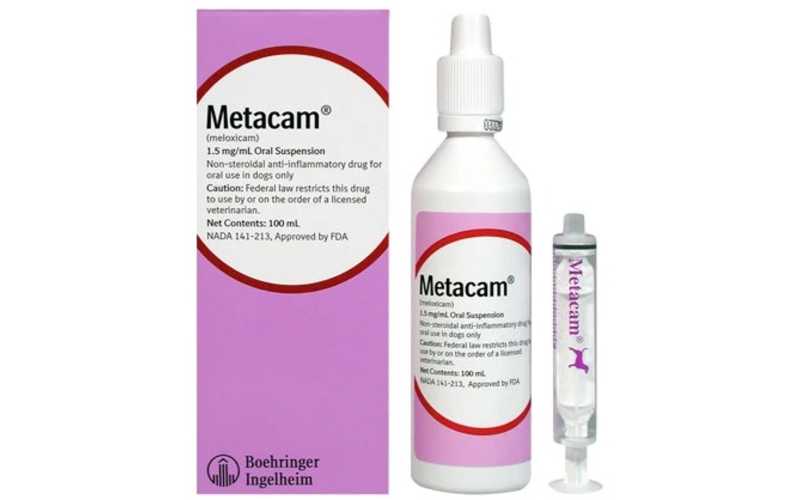patterdaleterriers.co.uk does not intend to provide veterinary advice. We go to great lengths to help users better understand their dogs; however, the content on this blog is not a substitute for veterinary guidance. For more information, please read our privacy policy.
Metacam (meloxicam) is a safe and effective non-steroidal anti-inflammatory drug (NSAID) for the management of pain and inflammation associated with osteoarthritis in adult dogs. It can also be used to treat acute pain and inflammatory conditions including musculoskeletal disorders, intervertebral disc disease, cranial cruciate ligament disease, hip dysplasia, and dermatologic conditions.
What is Metacam for Dogs?
Meloxicam is a NSAID produced by Boehringer Ingelheim Vetmedica Inc., Germany/Fort Dodge Animal Health (subsidiary of Pfizer). It is licensed for use in dogs in the United States following oral administration, is highly lipid-soluble, and is available as a flavored tablet. It has been shown to have minimal adverse reactions in clinical trials of up to two years duration with doses up to 32 mg/kg/day. Compared to other NSAIDs, meloxicam is unique in that it helps maintain normal cartilage levels while providing pain relief associated with osteoarthritis.
Meloxicam’s oral bioavailability is over 90%, with a half-life of 16 hours in dogs and a low potential for accumulation. The drug is metabolized nearly completely through conjugation, primarily in the liver, so catabolism by renal mechanisms only plays a minor role. There are no known active metabolites. The drug is rapidly absorbed from the GI tract and enters into the bloodstream, where it begins to exert its effects. Its volume of distribution is 11 L/kg, which is similar to that of other NSAIDs such as carprofen (4-18 L/kg). Peak plasma concentrations are reached within one hour of dosing and a substantial portion of the drug is bound to plasma proteins. The drug crosses the placenta, but it is unknown whether or not it can cross the blood-brain barrier.
Metacam’s primary mechanism of action involves inhibition of prostaglandin synthesis by blocking cyclooxygenase (COX) activity. Metacam selectively blocks one of two isoforms of cyclooxygenase (COX-2) and does not significantly affect COX-1. COX is an enzyme required for the production of prostaglandins, a class of hormones involved in cell communication, inflammatory processes, and pain management. Prostaglandins mediate inflammation through their effects on smooth muscles and the endothelium. Metacam has been found to increase circulating concentrations of certain prostaglandins involved in a protective mechanism against gastric acid secretion, while at the same time inhibiting pain-related prostaglandins produced by inflamed tissues.
In dogs, metacam’s analgesic effects reportedly last for 1-2 hours. However, in one clinical study of hip dysplasia, it was shown to provide adequate pain relief for up to 12 hours post administration. It has also been proposed that the lipid solubility and tissue binding of metacam are responsible for its duration of action and efficacy in treating inflammation associated with degenerative joint disease. The drug has been shown to be effective in the management of postoperative pain, acute soft tissue injuries, and cancer pain among other conditions.
Use of Metacam in Dogs Health
Meloxicam is well-tolerated by dogs with no adverse effects leading to discontinuation of therapy noted in clinical trials. Approximately 20% of the dogs subjected to adverse event monitoring in two year studies experienced at least one adverse reaction; however, most of these were considered mild and self-limiting. A very low incidence of vomiting has been reported in clinical trials with meloxicam dogs receiving doses up to 8 times the recommended dose, while gastrointestinal disturbances were more commonly noted at higher doses. Gastrointestinal-related side effects include anorexia, nausea, and vomiting.
Adverse Reactions
More serious adverse reactions have been noted in the form of ulceration of the gastrointestinal tract with meloxicam-related lesions primarily occurring in the small intestine; however enterocolitis has also been reported rarely at doses up to 100 mg/kg. Concurrent administration of NSAIDs with gastric ulceration has been implicated by some, but not all, veterinary clinicians in the development of ulcers.
In general, meloxicam is considered less likely to induce adverse reactions than other NSAIDs because it does not inhibit COX-1 or affect platelet aggregation like conventional NSAIDs do. The drug also differs from many other canine NSAIDs in that it does not significantly inhibit some isoforms of the enzyme CYP450, which could lead to elevated drug concentrations and potential toxicity.
What is the Recommended dose for Dogs?
The typical dose for dogs is 0.12-0.6 mg/lb given orally once daily or every other day as needed. The maximum recommended dose is 0.5 mg/lb (1.5 mg/kg) with dosing not to exceed every third day and never more than 2 times a week. The drug is generally well-tolerated by dogs, but it should be used cautiously in dogs with known gastrointestinal ulceration or bleeding tendencies.
Remember to always seek Veterinary Advice
Remember that it’s important to always seek Veterinary advice before using any drugs on your dog.
If you enjoyed this article you might also like to read about CBD Oil for Dogs UK

